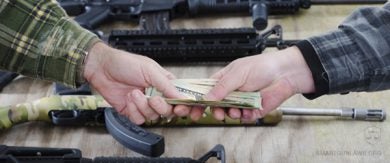3 Steps to Properly Conduct a Private Firearm Sale
Rachel 04.20.18

I remember the first time I bought a pair of shoes online for my husband. They were shipped to our house. He put them on – hated them – and we promptly sold them to someone else.
I never gave another thought to what happened to the shoes after I sold them.
- They could have been used to help a runner win a marathon.
- They could have been used to help a purse snatcher evade capture.
I don’t know who I sold them to, only that they liked the style and size of the shoes and had the money to buy them from me.
Along a similar vein, in 2012, a Wisconsin man purchased a firearm through a private sale via Armslist. The seller had a firearm that they’d purchased, decided that perhaps they didn’t like the recoil, it didn’t feel right in their hand, or that they wanted a different caliber instead.
For whatever reason the seller listed it, sold it, met the buyer who had the money and was interested in the firearm…and the transaction was complete.
Until it wasn’t.
It turns out that the man from Wisconsin was also a convicted domestic abuser who’d been unable to purchase a firearm through traditional channels and turned to Armslist for a private sale.
After the sale, the buyer went to the spa where his wife worked, opened fire, and killed his wife and several of her co-workers.
The Wisconsin Supreme Court ruled yesterday that the website used to list the firearm could be held liable for negligence in the private sale.
As far as Armslist and the Communications Decency Act of 1996 is concerned, the ruling decided that:
The act provides immunity to website operators, such as Armslist, only when the allegations treat the website as the publisher or speaker of third-party content,” the court said Thursday in its unanimous ruling. “The act does not protect a website operator from liability that arises from its own conduct in facilitating user activity.
We’ve all purchased firearms that we didn’t like for one reason or another. Some people sell them to or through a Federal Firearms Licensee (FFL). Others choose to sell the guns privately. Either way – as long as the seller is in compliance with the selling of that firearm, no law has been broken.
However, if the court ruled that Armslist should have policed the transactions being conducted on their website – what’s not to say that they don’t find the seller responsible and liable as well?
How to Sell a Firearm
If you are in a state where it is legal to sell a firearm via private sale without the cooperation of an FFL, you are losing the protection of the background check to ensure you aren’t selling to a felon (and for the buyer to know that they aren’t purchasing a stolen firearm).
While you may not be able to conduct the background check yourself, there are still a few things you can do to ensure you are selling responsibly.
Note – these will not ensure 100% that you are not selling your firearm to someone who shouldn’t purchase it, but will at least increase the likelihood that the transaction is above-board.
Step 1 – Ask the buyer for a concealed carry permit if possible. Statistically, a CCP holder is much less-likely to be involved in a crime than not.
Step 2 – Require a Bill of Sale. Whether you’re the buyer or seller, a Bill of Sale will show that the firearm was transferred to another owner and that both parties agree that there are no nefarious intentions involved in the transaction. More on that in a moment.
Step 3 – Peace of Mind Transfer. You can conduct a private sale while involving an FFL without it ever being signed onto the books of the FFL. At our shop, we call this a “Peace of Mind Transfer” to reassure the buyer that the gun isn’t stolen and to let the seller know that they aren’t selling the gun to a felon.
Private sales by an FFL from one individual to another do not require the FFL to sign the gun onto the books. However, both parties must be present at the time of the transfer (you can’t drop the gun off and leave).
What Happens When a Gun is Used in a Crime?
Another word on the Bill of Sale. When a gun is used in a crime and recovered by law enforcement, the serial number is sent via the ATF Tracing Center to the manufacturer to ask where the gun was shipped.
The manufacturer can show via their books that the gun was shipped to a distributor, who can show that they shipped it to a specific FFL/gun store who can show that they sold it to Joe Seller.
The Tracing Center follows the trail of the gun until they get to the individual. It is then the responsibility of the individual to show what happened to the gun after they purchased it.
The Bill of Sale shows that you as seller are a responsible gun owner, ensuring that you have the contact information with which to assist the police in their investigation (and therefore lessen the possibility of you being held liable).
The bottom line is that this case in Wisconsin is only the tip of the iceberg and has now opened the door for liability in private sales across the board. It is the responsibility of the gun owner to ensure that they’re doing everything possible to know that the firearm being sold will not wind up in the hands of someone who shouldn’t own it.
